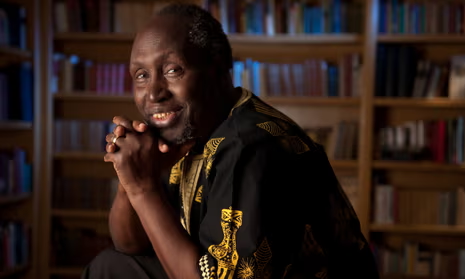Ngugi wa Thiong’o, the revered Kenyan novelist, playwright, and scholar whose fearless critique of colonialism and post-independence elites reshaped African literature, passed away on Wednesday, May 28, 2025, in Buford, Georgia, at the age of 87.
His death, confirmed by his son Nducu wa Ngugi and his U.S. publisher, The New Press, marks the end of a remarkable six-decade career dedicated to chronicling Kenya’s turbulent journey from colonial subjugation to self-rule and advocating for the use of African languages in literature.
His Early Life

Born James Thiong’o Ngugi on January 5, 1938, in Kamiriithu, near Limuru, Kenya, Ngũgĩ grew up in a large Kikuyu family during the height of British colonial rule. His early life was profoundly shaped by the Mau Mau Uprising (1952–1960), a pivotal rebellion against colonial oppression.
The conflict touched him personally, his half-brother Mwangi was killed as a member of the Kenya Land and Freedom Army, another brother, Gitogo, was fatally shot by British forces due to his deafness preventing him from hearing a command, and his mother was tortured at a local home guard post.
These experiences of loss and resistance became a cornerstone of Ngũgĩ’s literary voice, infusing his work with themes of resilience and defiance.
Early Achievements and Literary Ascent
Ngũgĩ’s intellectual journey began at Alliance High School, an elite institution run by British missionaries, where his family’s sacrifices enabled his education.
He later attended Makerere University in Kampala, Uganda, earning a B.A. in English in 1963. At Makerere, he attended the 1962 African Writers Conference, where he shared manuscripts of his debut novel, Weep Not, Child, with Nigerian author Chinua Achebe. Published in 1964, it became the first major English-language novel by an East African writer, earning critical acclaim for its poignant depiction of the Mau Mau struggle.
His subsequent novels, The River Between (1965) and A Grain of Wheat (1967), solidified his reputation as a leading voice in African literature.
In 1967, Ngũgĩ embraced Fanonist Marxism and began teaching at the University of Nairobi, where he sparked a movement to abolish the English department, advocating for African literature and languages to take center stage.
By 1970, he renounced his colonial name, James, adopting Ngũgĩ wa Thiong’o, and vowed to write primarily in his native Gikuyu, a radical act to reclaim cultural identity.
His 1977 novel Petals of Blood sharply criticized Kenya’s post-independence elite, accusing them of perpetuating colonial inequalities.
Imprisonment and Exile
That same year, his play Ngaahika Ndeenda (I Will Marry When I Want), co-written with Ngũgĩ wa Mirii, provoked the Kenyan government under President Jomo Kenyatta, leading to its shutdown after six weeks and Ngũgĩ’s arrest.
Imprisoned without trial for nearly a year in Kamiti Maximum Security Prison, Ngũgĩ turned adversity into creativity, writing Caitaani Mũtharaba-Inĩ (Devil on the Cross), the first modern novel in Gikuyu, on toilet paper. Released in 1978 after Daniel arap Moi assumed the presidency.
Ngugi faced continued harassment and learned in 1982 of a plot to kill him, prompting a 22-year exile in the UK and later the US. During this period, he held professorships at Yale, New York University, and the University of California, Irvine, where he founded the International Center for Writing & Translation.
Literary Legacy and Awards

Ngũgĩ’s commitment to decolonizing literature extended beyond his fiction. In his seminal 1986 essay collection Decolonising the Mind, he argued that African writers must reject colonial languages like English and French to reclaim cultural authenticity, famously challenging peers like Chinua Achebe for writing in English.
His short story The Upright Revolution: Or Why Humans Walk Upright became the most translated African literary text, available in over 100 languages, surpassing Achebe’s Things Fall Apart.
His extensive body of work includes novels like Matigari (1986), Wizard of the Crow (2006), and The Perfect Nine (2020), as well as plays, memoirs (Detained: A Writer’s Prison Diary, 1981; Dreams in a Time of War, 2010), and children’s books.
Ngũgĩ’s accolades include the 2001 International Nonino Prize, the 2016 Park Kyong-ni Prize, the 2019 Premi Internacional de Catalunya, and the 2022 PEN/Nabokov Award, though the Nobel Prize for Literature, for which he was frequently nominated, eluded him, to the dismay of fans and scholars.
Personal Challenges and Health Struggles
Ngũgĩ’s personal life was complex and not without controversy. Married twice, first to Nyambura, with whom he had six children, and later to Njeeri, with whom he had two, he faced allegations of domestic abuse from his son Mũkoma wa Ngũgĩ in 2024.
Mũkoma claimed Ngũgĩ physically abused Nyambura, who died in 1996, sparking debate about his legacy. Ngũgĩ did not publicly respond to the allegations, which some argued overshadowed his literary contributions.
Health challenges also marked his later years. Diagnosed with prostate cancer in 1995 and given three months to live, Ngũgĩ defied the prognosis. He underwent triple bypass heart surgery in 2019 and battled kidney failure, yet continued writing and teaching until his final days.
Global Tributes and Enduring Impact
Ngũgĩ’s passing has prompted an outpouring of tributes. Kenyan President William Ruto praised his “undeniable patriotism” and “quest for truth,” while Professor Macharia Munene called his work a “true reflection of society.”
On X, South African politician Mbuyiseni Ndlozi mourned him as “Africa’s greatest literary pen” and a “warrior for indigenous African languages.”
Ngũgĩ wa Thiong’o leaves behind a towering legacy as a storyteller, activist, and scholar who challenged the linguistic and cultural vestiges of colonialism. His insistence on the power of African languages continues to inspire writers and readers worldwide, ensuring his voice endures in the global literary canon.
Discover more from LN247
Subscribe to get the latest posts sent to your email.



Comments are closed.